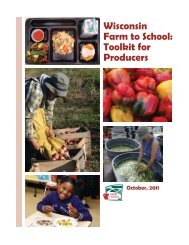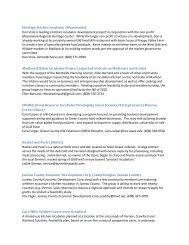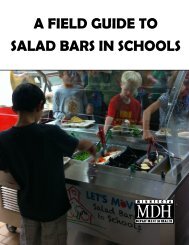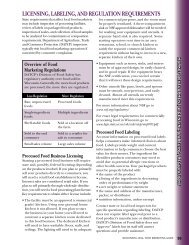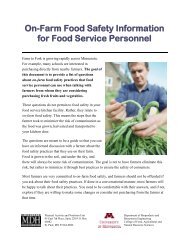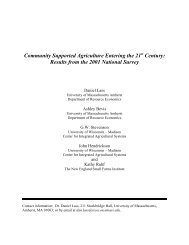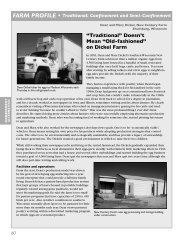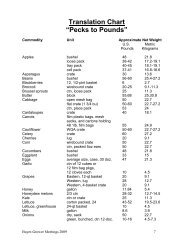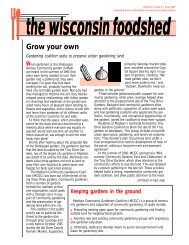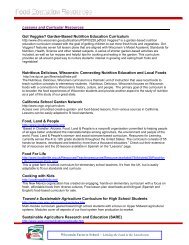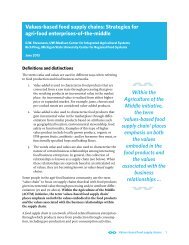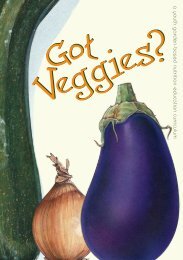Poultry Your Way - Center for Integrated Agricultural Systems ...
Poultry Your Way - Center for Integrated Agricultural Systems ...
Poultry Your Way - Center for Integrated Agricultural Systems ...
You also want an ePaper? Increase the reach of your titles
YUMPU automatically turns print PDFs into web optimized ePapers that Google loves.
MANAGEMENT<br />
ALTERNATIVES<br />
52<br />
FARM PROFILE • Industrial: Confinement<br />
How Cooperation Saved Turkey Farms<br />
from Death by Dis-integration<br />
Joel Bussis<br />
In most large poultry operations, farmer-producers are “integrated”<br />
into larger systems in which most management decisions are made by<br />
others. Those in charge, the integrators, might be feed or equipment<br />
supply companies, processing companies, or marketing companies. For<br />
10 years, John and Joel Bussis were part of a system like that, growing<br />
turkeys <strong>for</strong> Bil-Mar Foods, a division of Sara Lee. John and Joel owned<br />
the buildings and provided the labor, and they could earn bonuses if<br />
the birds per<strong>for</strong>med well. But the kind of birds they fed, when and<br />
what they fed them, and what they would be paid <strong>for</strong> them were all<br />
part of the contract written by Bil-Mar. In 1997, Bil-Mar management<br />
decided the real money in the turkey business lay in marketing a<br />
brand name product—not in its actual production or processing. They<br />
told their growers there would be no future production contracts, that<br />
existing contracts would be terminated at the end of 1999 and growers<br />
paid off, and that turkey processing operations in Zeeland, Michigan,<br />
would be phased down in 1998 and ended the next year.<br />
The Bil-Mar decision to “dis-integrate” gave real meaning to the word, <strong>for</strong> it left the growers disconnected, without<br />
a market, and without the coordinating services Bil-Mar provided along with the market. The Bussises suddenly<br />
faced the extinction of their farm. They owned only 58 acres, more than half of it devoted to specialized buildings<br />
and a manure composting area. What do you do with facilities dedicated to the production of 100,000 tom turkeys<br />
a year? Luckily (it turned out), about 15 other turkey growers faced the same problem. And because it was a<br />
broad problem—the future of an entire regional industry—the state of Michigan saw an economic and social<br />
interest as well. With help of the state, the work of poultry scientists at the land grant university, the desire of<br />
growers to continue growing turkeys, and the skills and needs of <strong>for</strong>mer Bil-Mar employees also facing loss of jobs<br />
and careers, the industry was saved within a new structure.<br />
Today, growers and workers within the Michigan Turkey Producers’<br />
Cooperative are producing about 4.5 million heavy tom turkeys a year,<br />
processing them through their own plant, and selling turkey meat to end<br />
users. A brand name, “Golden Legacy,” has been developed <strong>for</strong>, as Bil-Mar aptly<br />
perceived, the real money is in marketing branded products.<br />
The new structure is no less integrated than it was under Bil-Mar. But now,<br />
the 15 growers sit on a board of directors and make decisions once made by<br />
Bil-Mar. These decisions affect the strains of birds the growers produce, the<br />
size the birds will be at slaughter weight, feed, and the kind of products the<br />
cooperative will sell. The members also attempt to keep antibiotic use low,<br />
but antibiotic use is not proscribed. “It’s been six months since we’ve used any<br />
medication in the brooder barns and more than two years since we’ve used<br />
them in the grower barns,” Joel said. “But not many producers can say that.”<br />
Joel Bussis, Trestle Town Turkeys<br />
Hamilton, Michigan<br />
These turkeys are close to market<br />
weight of 40 pounds.<br />
Joel’s father, John, was an important driver in <strong>for</strong>mation of the cooperative. As his work was starting to pay off,<br />
he died of cancer at age 61. So Joel is now the sole proprietor of Trestle Town Turkeys, Hamilton, Michigan. He is<br />
production-oriented, he said, and is pleased that his dad’s legacy includes a friendly marketing structure in which<br />
his skill and experience growing turkeys can pay off.



